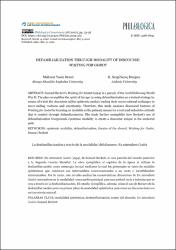| dc.contributor.author | Demir, Mahmut Yasin | |
| dc.contributor.author | Durgun, Sezgi Saraç | |
| dc.date.accessioned | 2022-09-12T10:27:17Z | |
| dc.date.available | 2022-09-12T10:27:17Z | |
| dc.date.issued | 2022 | en_US |
| dc.identifier.uri | https://hdl.handle.net/20.500.12868/1533 | |
| dc.identifier.uri | https://ojsspdc.ulpgc.es/ojs/index.php/PhilCan/article/view/1491 | |
| dc.description.abstract | Samuel Beckett's Waiting for Godot (1954) is a parody of the world following World War II. The play exemplifies the spirit of the age by using defamiliarization as a textual strategy by means of which the characters utilize epistemic modals leading their conversational exchanges to never-ending voidness and uncertainty. Therefore, this study analyses discoursal features of Waiting for Godot by focusing on modality as the primary means for a void and indecisive attitude that is created through defamiliarization. The study further exemplifies how Beckett's use of defamiliarization foregrounds epistemic modality to create a discourse unique in his authorial path. | en_US |
| dc.language.iso | eng | en_US |
| dc.relation.isversionof | 10.20420/Phil.Can.2022.465 | en_US |
| dc.rights | info:eu-repo/semantics/openAccess | en_US |
| dc.subject | epistemic modality, defamiliarization, theatre of the absurd, Waiting for Godot, Samuel Beckett | en_US |
| dc.subject | epistemic modality | en_US |
| dc.subject | defamiliarization | en_US |
| dc.subject | theatre of the absurd | en_US |
| dc.subject | Waiting for Godot | en_US |
| dc.subject | Samuel Beckett | en_US |
| dc.title | Defamiliarization through modality of discourse: Waiting for Godot | en_US |
| dc.type | article | en_US |
| dc.contributor.department | ALKÜ, Fakülteler, Eğitim Fakültesi, Yabancı Diller Eğitimi Bölümü | en_US |
| dc.identifier.volume | 28 | en_US |
| dc.identifier.startpage | 23 | en_US |
| dc.identifier.endpage | 36 | en_US |
| dc.relation.journal | Phililogica Canariensia | en_US |
| dc.relation.publicationcategory | Makale - Uluslararası Hakemli Dergi - Kurum Öğretim Elemanı | en_US |


















